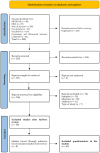Measuring Parental School Involvement: A Systematic Review
- PMID: 40558839
- PMCID: PMC12191724
- DOI: 10.3390/ejihpe15060096
Measuring Parental School Involvement: A Systematic Review
Abstract
Parental school involvement (PSI) is a multidimensional construct that significantly influences children's academic adjustment and overall development. However, inconsistencies persist in its definition and measurement, with researchers operationalizing PSI through a varied of parental activities. This study aimed to (1) identify PSI instruments and their theoretical models and (2) evaluate their psychometric properties. Following PRISMA guidelines (PROSPERO ID CRD42023451091, registered August 2023), this systematic review examined six databases (Web of Science, ERIC, MEDLINE, Psychology and Behavioral Sciences Collection, PsycArticles, and PsycInfo), analyzing quantitative studies from 2000 to 2024. Inclusion criteria encompassed instruments designed for parents, teachers, or children aged 6-15 and published in peer-reviewed journals in English, Portuguese, Spanish, or French. From an initial pool of 490 records, 38 studies were included, yielding 43 instruments: 23 for parents, 15 for children, and 5 for teachers. Seven instruments followed Epstein's model, while nine followed the Hoover-Dempsey and Sandler framework, underscoring the prominence of these theoretical approaches. The study quality, assessed with MMAT, was generally moderate to high. Despite an exhaustive search effort, it is possible that some relevant instruments were not identified. Nevertheless, this review advances the understanding of PSI operationalization, promotes more consistent and replicable assessments, enhances alignment between instruments and study objectives, and strengths the validity of findings derived from these tools.
Keywords: children; measures; parental school involvement; parents; psychometric; systematic review.
Conflict of interest statement
The authors declare no conflicts of interest.
Figures
Similar articles
-
A systematic review of tools designed for teacher proxy-report of children's physical literacy or constituting elements.Int J Behav Nutr Phys Act. 2021 Oct 8;18(1):131. doi: 10.1186/s12966-021-01162-3. Int J Behav Nutr Phys Act. 2021. PMID: 34620185 Free PMC article.
-
The measurement of collaboration within healthcare settings: a systematic review of measurement properties of instruments.JBI Database System Rev Implement Rep. 2016 Apr;14(4):138-97. doi: 10.11124/JBISRIR-2016-2159. JBI Database System Rev Implement Rep. 2016. PMID: 27532315
-
School-based education programmes for the prevention of unintentional injuries in children and young people.Cochrane Database Syst Rev. 2016 Dec 27;12(12):CD010246. doi: 10.1002/14651858.CD010246.pub2. Cochrane Database Syst Rev. 2016. PMID: 28026877 Free PMC article.
-
Eliciting adverse effects data from participants in clinical trials.Cochrane Database Syst Rev. 2018 Jan 16;1(1):MR000039. doi: 10.1002/14651858.MR000039.pub2. Cochrane Database Syst Rev. 2018. PMID: 29372930 Free PMC article.
-
Education support services for improving school engagement and academic performance of children and adolescents with a chronic health condition.Cochrane Database Syst Rev. 2023 Feb 8;2(2):CD011538. doi: 10.1002/14651858.CD011538.pub2. Cochrane Database Syst Rev. 2023. PMID: 36752365 Free PMC article.
References
-
- Addi-Raccah A., Dusi P., Seeberger Tamir N. What can we learn about research on parental involvement in school? Bibliometric and thematic analyses of academic journals. Urban Education. 2023;58(10):2276–2307. doi: 10.1177/00420859211017978. - DOI
-
- Adeyemo D. A. Parental involvement, interest in schooling and school environment as predictors of academic self-efficacy among fresh secondary school students in Oyo State, Nigeria. Electronic Journal of Research in Educational Psychology. 2005;5-3(1):163–180.
-
- Alieva A. Parental involvement in formal education. European Commission; 2021. NESET Ad hoc report no. 1/2021.
-
- Antipkina I., Ludlow L. H. Parental involvement as a holistic concept using Rasch/Guttman scenario scales. Journal of Psychoeducational Assessment. 2020;38(7):846–865. doi: 10.1177/0734282920903164. - DOI
Publication types
LinkOut - more resources
Full Text Sources



